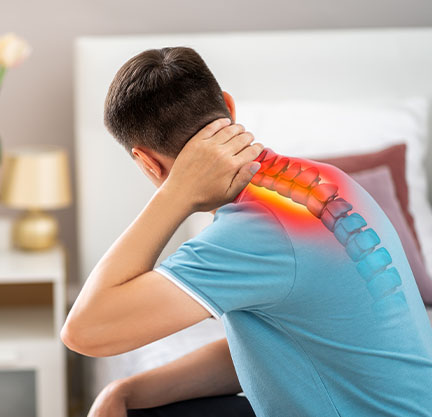Written by Dr Michael Maeder (Chiropractor)
Do you often complain of neck pain? Is your neck always stiff and sore? Have you been treated but only received short-term relief for your neck pain?
“Neck pain is the fourth leading cause of disability”¹
Put your hand up if you have neck pain right now! That’s a lot of people. Now put your hand up if you’ve ever had neck pain! That’s pretty much everybody. Yes, neck pain is incredibly common.
For some, it’s only occasional. For others, it’s a chronic issue with only short-lived relief. From a clinical perspective, chronic neck pain is one of the most frequent complaints we see. Interestingly, many patients come in for other problems — back pain, headaches, fatigue — but when asked, they almost always admit to persistent neck discomfort as well.
Two Key Observations About Neck Pain:
1. People accept chronic neck pain as normal
2. People usually only seek help when it gets severe, or when it begins to cause tension headaches or interfere with daily life
If you’ve had successful neck pain treatment and it’s resolved permanently — that’s fantastic. But the reality? You’re in the minority.
The Two Common Groups of Neck Pain Sufferers:
Group 1: Those who suffer in silence and simply accept limited neck mobility and stiffness as their normal
Group 2: Those who get regular treatments (massage, adjustments, dry needling, ultrasound) but find the pain always returns
They may get temporary relief, but the pain never fully goes away. Often, they’re also given a long list of stretches and neck exercises that offer little improvement.
Why Does Neck Pain Keep Coming Back?
Because the cause of neck pain is often not in the neck itself.
The head — weighing around 5kg — rests on top of the spine, supported by the neck. It’s a balancing act of stability and mobility, complicated by everyday tasks, poor ergonomics, and stress.
It should be no surprise that other structural dysfunctions or systemic issues can affect how the neck performs.
What’s frustrating is that many health practitioners fail to look beyond the neck and simply repeat the same treatment, again and again, expecting different results.
If You’ve Tried Everything for Neck Pain and Nothing Works — You’re Not Alone
Recurrent neck pain is a sign that the real issue hasn’t been addressed. If you’ve been stuck in a cycle of repeat treatments and no progress, it’s time to consider a holistic approach to neck pain.
Here are 3 commonly untreated causes of neck pain:
1. TMJ Dysfunction (Temporomandibular Joint)
The jaw and neck connection is often overlooked. If your TMJ is misaligned or dysfunctional, it can pull on the surrounding muscles and create compensatory tension in the neck. Many chronic neck pain sufferers have undiagnosed TMJ issues.
2. Shoulder Blade Instability
Your shoulder blades play a crucial role in upper body posture and neck alignment. When the scapulae are unstable, it forces the neck to work harder to stabilize the head, leading to overuse and fatigue in the neck muscles.
3. Postural Fatigue from Carbohydrate Mismanagement
Poor posture isn’t always about bad ergonomics — sometimes, it’s a metabolic issue. When your body struggles with blood sugar regulation, it leads to postural fatigue, especially in the core and spinal stabilizers. As posture collapses, the neck compensates, causing pain.
Final Thoughts: Treat the Whole Body, Not Just the Neck
Neck pain should not be your constant companion. If it keeps coming back, it means your current treatment is missing the mark. The answer often lies in treating underlying dysfunctions — not just the symptoms in your neck.
If this sounds like you (or someone you care about), and you’re ready for a different approach to neck pain relief, contact us today to book an appointment.
BOOK WITH DR MICHAEL (CHIRO) HERE: https://the-barefoot-chiro.au4.cliniko.com/bookings?practitioner_id=1680792278211241025&appointment_type_id=1704077740690384600 or read more about Dr Michael here: Michael Maeder – The Barefoot Chiro
References:
Epidemiology, Diagnosis, and Treatment of Neck Pain, Steven P. Cohen MD – ScienceDirect Article

